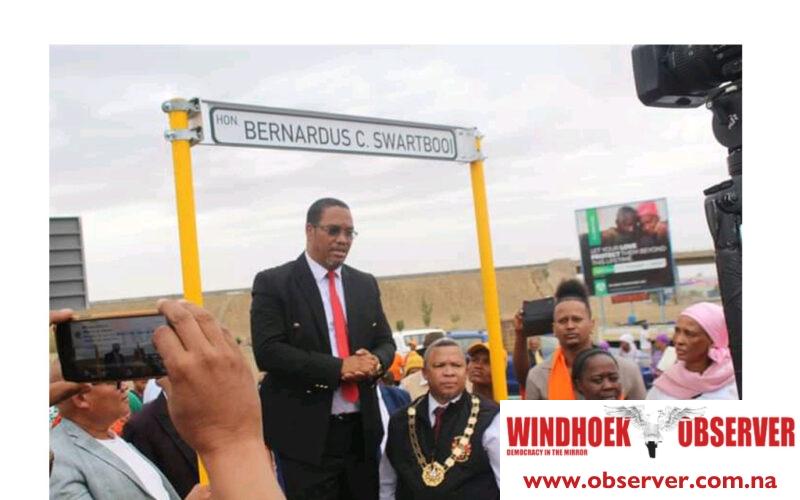Martin Endjala
Several local authorities and Swapo councillors in the ||Karas and Hardap regions have objected to the street renaming in the region, describing it as unlawful.
They say the street renaming was unjust because due process was not followed.
Notable individuals, such as the leader of the Landless People’s Movement (LPM), Bernadus Swartbooi, have had streets named after them.
Oranjemund deputy mayor Sekunda Tsheya Petrus could not respond as she was busy in a meeting.
Mariental Swapo councillor Mairos Skrywer said she was against the renaming of the street to that of the LPM leader.
“I told the council that I do not agree. What did Swarbooi do in Mariental for him to get a street named after him? The LPM councillors decided to go ahead and not only disregard my concern, but they also never gave the public an opportunity to give their input,” she said.
She claimed they didn’t follow protocol because there was no notice of objection, and she promised to change the name if she were to take office in the next term.
Billy Mensah, another Swapo councillor at Mariental town council, said he has not seen any notice of objections to the names and the only notice he saw was a 72-hour notice calling for a special council meeting on the renaming of streets.
Mensah said the public did not have input on the renaming of the street.
Currently, there is no specific law in the local authority that deals with renaming or naming streets.
The ||Karas regional Swapo district coordinator, Mathew Mumbala, said that in towns such as Keetmanshoop and others, he has not seen any notice of objections on the names.
“If they think that they can use this sort of strategy to make decisions favouring them before they vacate office, they must think again. Because when we take over office, we will reverse all these unprocedural decisions they are taking,” he warned.
Mumbala explained that there is a committee that deals with renaming streets and proposing names.
The committee then recommends to the council to take a resolution.
Next, the council must proceed to secure approval from the suggested individuals and subsequently release them for public scrutiny.
This means that the next councillors who will take over the office will change the names, as procedures were not followed.
Oranjemund mayor, Elias Kasemba has defended the renaming of streets in the Hardap and Karas regions.
Kasemba explained that the street renaming followed all due processes and was not politically driven, noting that those selected have contributed to the region’s development.
“We followed all due process. Nobody gets to be given a street name just like that. We notified them and some agreed, while others we could not get hold of them,” he said.
Kasemba was quick to refute the assumption that Swartbooi was handpicked, stating that one of the reasons he was selected and approved was due to the fact he was a former governor of the region.
He feels that individuals who have contributed to the growth of the town and region should receive recognition while they are still alive, as this is often the case after death.
Kasemba also clarified that the process is ongoing to identify more people who will receive honours in the future.
He said that many of the street names date back to colonial times, and they aim to replace them by honouring those who are positively impacting society and bringing much-needed development to the people.
“Swartbooi was very important in formulating a pathway to the development of the town and the region that we are enjoying today. So this is one way of honouring him and others who have also played their roles in shaping their regions.,” he explained.
Those who questioned the street renaming, including former ambassador Pius Dunaiski, questioned the timing of the renaming, suggesting it might be politically motivated ahead of the upcoming elections.
He said the issue of naming and renaming streets, buildings and other public places to honour politicians, still alive, is controversial and fraught with pitfalls.
“Why LPM’s decision to engage in such activities just before the elections raises questions. First, Swapo has been doing it since independence in a big way. It might be that LPM thought it was a political gimmick to draw attention so close to the watershed November elections,” he said.
Dunaiski said he has always been critical of this naming and renaming because it lacks foresight and maturity.
He said that if a specific individual loses their reputation due to a scandal or misbehaviour, the country will be in a state of shame.
“I believe it is better to wait and to honour true heroes after their death, similar to the Roman Catholic Church on ‘sainthood’. This could also be viewed as vainglorious and cheap,” he opined.
He thinks Namibia should use legislation to regulate this issue, adding that party politics should not be involved in naming and renaming.
He said the street named after Bernhardt Esau, accused in the Fishrot scandal in Swakopmund, is a case in point.
Guame Stephanus, the LPM representative on the Oranjemund Town Council, said the Nama chief Cornelius Fredericks was also one of the nominees.
The LPM councillor asserted that the selection of names was based solely on merit and refuted any political bias.
Other figures, such as Nama chief Cornelius Fredricks and the first Oranjemund Covid-19 victim, are also set to be honoured in future street naming events.
“Omaruru Street, Herero Chief was supposed to do the unveiling, however, was unavailable and the mayor of Omaruru was invited. Swartbooi Street was also among the street unveilings,” he explained.
“It’s just strange that people question these names while we know what impact Swartbooi has had in society,” he stated.




